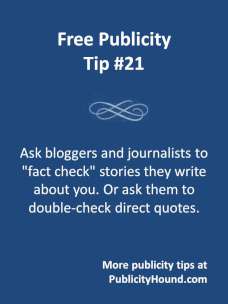This is the 21st in a series of “50 Tips for Free Publicity” on Pinterest. If you like it, repin it by clicking on the “Pin It” button above. And share it with your friends and followers on the other social media sites.
* * *
Journalists don’t want you to know about “fact checking” because it means more work for them.
But I want you to know about it because it’s a seldom-used tool that improves the accuracy of a story in which you are named and quoted.
Don’t use this tool every time you’re interviewed. Save it for particularly sensitive stories such as longer profiles pieces, or after a reporter interviews you about a controversial topic and you must do all you can to ensure that the quotes and other facts are 100 percent accurate.
Here’s How It Works
When a reporter requests an interview, ask, “After you write your story but before it’s printed, would you agree to fact-check the information that pertains to me, and read the direct quotes back to me?”
If the reporter says no, you might decide that you don’t want to do the interview.
If the reporter says yes—any reputable reporter should—proceed with the interview. When the reporter does the fact check, either by email or over the phone, listen very carefully and correct any errors. Understand, however, that if you don’t like the way a particular quote sounds, and you know that that’s how you said it, the reporter is under no obligation to remove it or “clean it up” just because you asked.
Why Reporters Will Agree to Fact-Check
New reporters might not be familiar with fact-checking, but experienced journalists will. Bigger publications such as Time magazine, for example, have fact-check departments that call all sources to verify information.
Most reporters will agree to a fact-check because, without one, they run the risk of printing inaccurate information. They already know you’re concerned about accuracy. And they know you’ll probably raise a stink if anything in the article is wrong, or if you’re misquoted.
A fact-check helps them avoid having to write a correction. It also decreases the chance that you’ll complain to their editor if something in the story is wrong.
Don’t Bother Asking TV Reporters
Unfortunately, the fact-check works only with print reporters.
If you’re interviewed for at TV news story, don’t even think about asking the reporter to check the facts. They might use a sound bite of only three to five seconds, and if they already have a recording of you saying it, there’s no reason to check it. The production schedule in a TV news room is so fast-paced, and the time between an interview and the actual broadcast can be so small, that a fact-check is out of the question.
What If The Story is Wrong?
If a reporter won’t agree to a fact-check, but you want to proceed with the interview, you have a few options if the story is inaccurate.
First, always call the reporter and ask for a correction because you want the publication to have a permanent record of it on file. If a new reporter comes onto the beat and uses information from an old story, you don’t want it to be wrong. Besides, newspapers usually print corrections at the bottom of Page 2, where few readers look. Your more important concern is to not have another writer repeat the mistake.
Don’t jump over the reporter’s head and go to an editor. If she refuses to print a correction, ask for the name of her immediate supervisor and speak to that person.
If the publication refuses to print a correction, write a letter to the editor. If the error is grevious, and you need a lot of space to clarify your position, call the editor and ask if you can write an opinion column for the op-ed page.
But What About Bloggers?
I’m a blogger, and no one has ever asked me for a fact-check.
One thing I sometimes do that I could never do when I worked at a newspaper was to let the person I’m writing about read the post before I publish it.
If a blogger wants to interview you, go ahead and ask about the fact check. It can’t hurt.
Bloggers, do you ever agree to fact-check? Journalists, how often do you do this? If not, why not? Publicity Hounds, have you asked for a fact-check? If so, have journalists agree?
A Tool to Help You:
